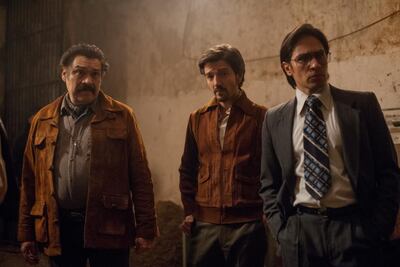Cocaine trade drama Narcos returns to Netflix for its fourth season this weekend, though it may not be quite how you remember it. With notorious Colombian kingpin Pablo Escabar already dead at the end of season two, and his successors in the Cali Cartel having decided to go legitimate at the end of season three, season four finds the action transplanted to Mexico, with a host of new characters and locations now central to the lucrative trade into the US.
Executive producer, showrunner and co-creator Eric Newman insists this is not simply a case of resetting the action to keep wringing profits out of a successful franchise, but rather the logical continuation of the previous three seasons: “The plan was always to go to Mexico – it's just a case of following the flow of cocaine, and in the 1990s the ground zero of the cocaine trade shifted from Colombia to Mexico,” he explains. “Colombia is a minor player now. They still grow it as the coca leaf doesn't grow in Mexico, but the Mexican cartels have far surpassed anything the Colombian ones did in terms of reach, size and violence.”
In fact, much of the action in season four overlaps with the previous three seasons as Newman and his team seek to explain how the Mexican cartels shifted from “junior partners” in the cocaine trade to top dogs, with one specific geographical factor crucial to their rise: “You can't accurately tell the story of the development of the Mexican cartels without going back to the time when the Colombians were very much running things and the Mexicans were junior partners,” he explains.
“Things changed when American law enforcement successfully shut down the Miami corridor where the Colombians would smuggle drugs in. That's when the Mexicans thought 'hang on, they're smuggling everything through this tiny corridor in the Caribbean – we've got 1,900 miles of border we've been smuggling stuff over for decades.' They basically re-purposed the existing routes that had been used for alcohol and Marijuana, and quickly became very successful.”
Newman has become something of an expert on the cocaine trade in four seasons of the show, and one lesson he has learned in particular is that US law enforcement is not winning the war on drugs. Nor, does he feels it is likely to: “What seems most clear from the history we're telling, and it's a subtle message, is that there is no victory in the drug war,” he says. “If you just attack supply, which is all we ever seem to do, you don't stand a chance. If we treated it as the healthcare crisis that it is, and successfully remove demand, that's the only way to win. The current tactics of locking up users and attacking supply lines in other countries is just a really ugly, cynical exercise in my opinion.”
And Newman doesn't sense any desire for a change of approach in the current political climate: “We now live in a time where we've been reduced to winners and losers, addicts and not, and there's no sympathy or empathy in it and that's going to continue for the foreseeable future. That horrible human quality of thinking that we're better than others has taken hold in the situation.”
That refusal to paint the drugs war and its combatants in black-and-white terms has been a defining feature of Narcos, and the show has even attracted criticisms in some quarters for portraying the likes of Escobar as semi-likeable characters, but this nuance is vital to the stories Newman and co are telling: "I originally developed the concept of Narcos as a movie in the 90s and started researching then," he explains.
“I realised that it's impossible to tell the story of a truly bad man, but actually humanise him too, in the space of a two-hour movie, and that's essential to me. These characters, are still people, and we live in a world now where everything is black and white. In a two-hour movie, if someone blows up an airplane and kills a bunch of people, he's a bad guy. That's all there's room for, but our goal is to show that there are things about these people that you can relate to. You might even like them in spite of everything they've done. I always say that monsters don't just scream from the womb, they're created by environment and situations and politics.”
Newman is keen to point out that while he may defend some seemingly indefensible characters, he is not in any way pro-cocaine, he simply has a slightly more in-depth understanding of the situation than the usual “drug-dealing baddie” school of thought: “I think if coca leaf grew in Virginia, it would be legal, or at least would have been for a long time,” he says.
“A lot of this is driven purely by money, and in these classist societies of Latin America it's impossible to break out of your place in society. In that situation, it's seriously difficult not to think about taking advantage of this incredible financial opportunity in the US. That's not to say I support the cocaine trade, but I also understand the people who choose this path and why they might do that.”
Narcos season 4 is on Netflix from November 16
___________________
Read more
'Game of Thrones' returning in April 2019 for final season
There are no plans for Netflix to get cheaper in India, according to CEO
Netflix's 'Patriot Act' brings the first Muslim chat-show host to American TVs
___________




